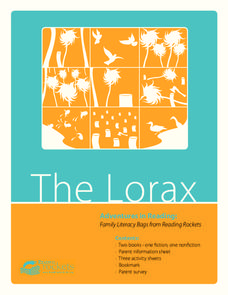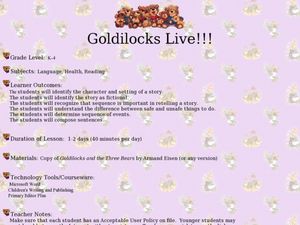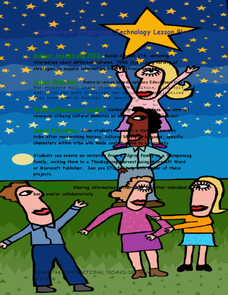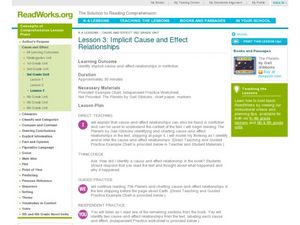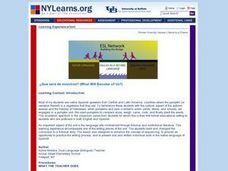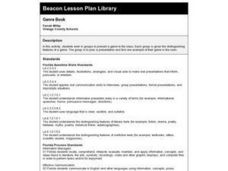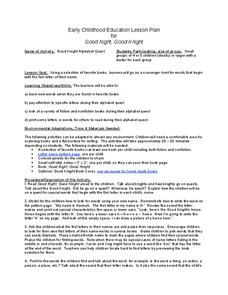PBS
Reading Adventure Pack: The Lorax
Accompany a reading of The Lorax by Dr. Seuss and Tell Me, Tree by Gail Gibbons with an activity packet designed to bring awareness to nature, specifically trees. Scholars take to the outside, draw lines to create trees reminiscent of...
Curated OER
Nonfiction Genre Mini-Unit: Persuasive Writing
Should primary graders have their own computers? Should animals be kept in captivity? Young writers learn how to develop and support a claim in this short unit on persuasive writing.
Curated OER
Establish the Theme
Second graders explore the topic of nature. In this detective lesson, 2nd graders review non-fiction materials on nature and identify text, headings, diagrams, graphs, to establish the theme of the book.
Curated OER
Summarize This!
Students explore how to summarize a reading passage. They read non-fiction books. Students use a Venn Diagram to compare and contrast the two animals they read about. They write a summary using the information in their Venn Diagram.
Curated OER
Red Legs: A Drummer Boy of the Civil War
Students identify and interpret the life of a drummer boy during the Civil War as well as about a reenactment. Students listen to a fictionalized story or a Civil War reenactor and compare ot with the life of the drummer boy the story...
Curated OER
Goldilocks Live!!!
Study story elements with your young learners. Read Goldilocks and the Three Bears and discuss the order of events by making a story panel out of butcher paper. Sentences are given as suggestions for the panel, though you may compose...
Curated OER
Welcome To Your Library
As an overview of the positive things the library has to offer, this would be a helpful presentation. However, it does not provide much information. This presentation could be augmented by adding details about the Dewey Decimal system or...
Curated OER
Reading Comprehension- Informational Passages "Abraham Lincoln"
Who was Abraham Lincoln? Help your English language learners recognize Lincoln's impact on the United States. After reading a short passage, learners answer five reading comprehension questions and five vocabulary questions.
Curated OER
Native Americans
First graders explore the lifestyles of several North American tribes. They investigate about the homes, food, transportation, and daily living habits of each tribe. Pupils use a map to locate several Native American tribes in North...
Curated OER
Implicit Cause and Effect Relationships
Cause and effect relationships can be found in both fiction and non-fiction texts. As they read the book, The Planets by Gail Gibbons, learners keep an eye out for cause and effect relationships. They chart all of the causes and effects...
Curated OER
Genre
In this genre study PowerPoint presentation, students read the definitions and characteristics of each literary genre. There are 17 genres that the PowerPoint presentation addresses, such as science fiction, tall tales and poetry.
Curated OER
?Que ser de nosotros? (What Will Become of Us?)
Students discuss uses of a pumpkin. They fill out graphic organizers. Students listen as the teacher reads a story, and participate by repeating sounds the objects make as the story progresses. One student narrates the story while others...
PBS
To Kill a Mockingbird Teacher's Guide
If you're planning a unit on To Kill a Mockingbird by Harper Lee, don't pass this resource by! It includes thorough discussion questions and vocabulary from the novel, research opportunities, and writing prompts to extend learning...
PBS
Reading Adventure Pack: Rocks
A Reading Adventure Pack focuses on rocks. Scholars participate in three activities after reading a fiction and nonfiction text—The Jade Stone, a Chinese folktale adapted by Caryn Yacowitz, and Rocks in His Head by Carol Otis Hurst....
PBS
Reading Adventure Pack: Folktales
Following a reading and thorough discussion of books—Anansi the Spider: A Tale from the Ashanti by Gerald McDermott and The Moon Book by Gail Gibbons—scholars complete three activities. First, they use playdough or cookie dough to create...
Curated OER
Introduce: Comparison and Contrast
Class discussions can really make concepts come to life. The class discusses the differences between compare and contrast, read a book, then talk about ways they can compare events or characters in the story. Good leading question are...
Penn State
Early Childhood Education Lesson Plan for Good Night, Good Knight
The book Good Night, Good Knight is the inspiration for this plan. Learners get into small groups to search for words in books that begin with their names and fill out and illustrate their own personal letter and name pages.
PBS
Reading Adventure Pack: Building
Scholars become architects in an engaging unit on building structures. The Reading Adventure Pack features Roberto: The Insect Architect by Nina Laden and Construction Zone with photographs by Richard Sobol and text by Cheryl Willis...
Curated OER
Rice is Nice
First graders explore Japanese foods through fairy tales, fiction and nonfiction books, cooking meals and eating with chopsticks. After all of the creative ideas have been utilized, the class holds a tea party for parents in the classroom.
Curated OER
Call It a Hunch
Give young scholars a chance to practice making inferences after reading the book Through My Eyes by Ruby Bridges. They confirm whether or not their conclusions are true, have a class discussion, and then independently complete an...
Curated OER
Chinese Minority Cultures
Seventh graders identify the elements that characterize culture in literature.
Students analyze the representation of Chinese minority peoples
through textbooks. Students identify and interpret the differences among the people of China.
Curated OER
Analyzing Textbook Formats
Students explore the characteristics of a non-fiction text. For this comprehension lesson, students are led on a guided tour of each text and identify the features of a non-fiction text. Students continue to practice locating features...
Curated OER
Putting the Truth in Writing
Learners define "nonfiction" and describe what they view as the best pieces of nonfiction writing. They determine criteria to evaluate whether or not a piece of nonfiction writing is good, and list categories of nonfiction writing.


